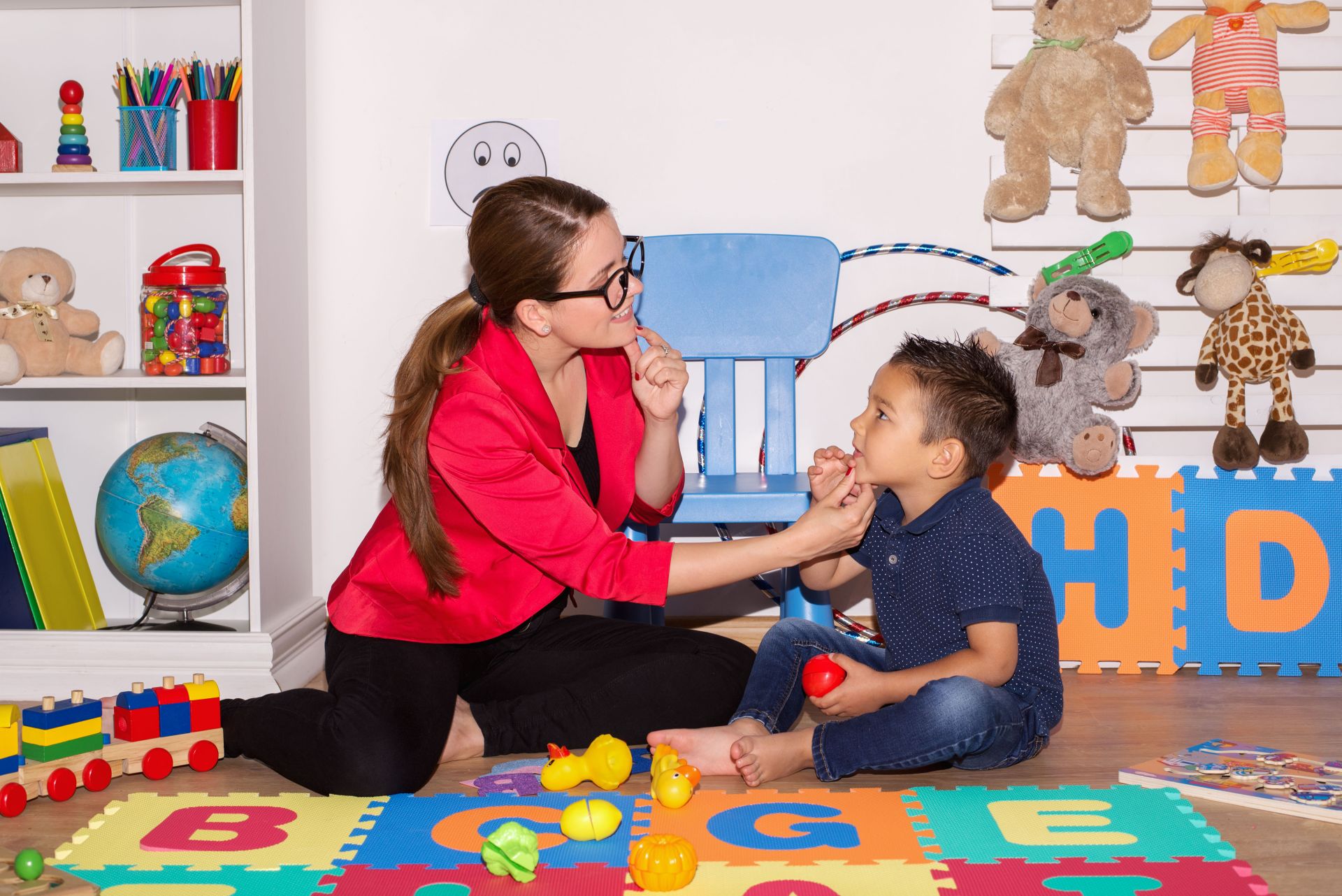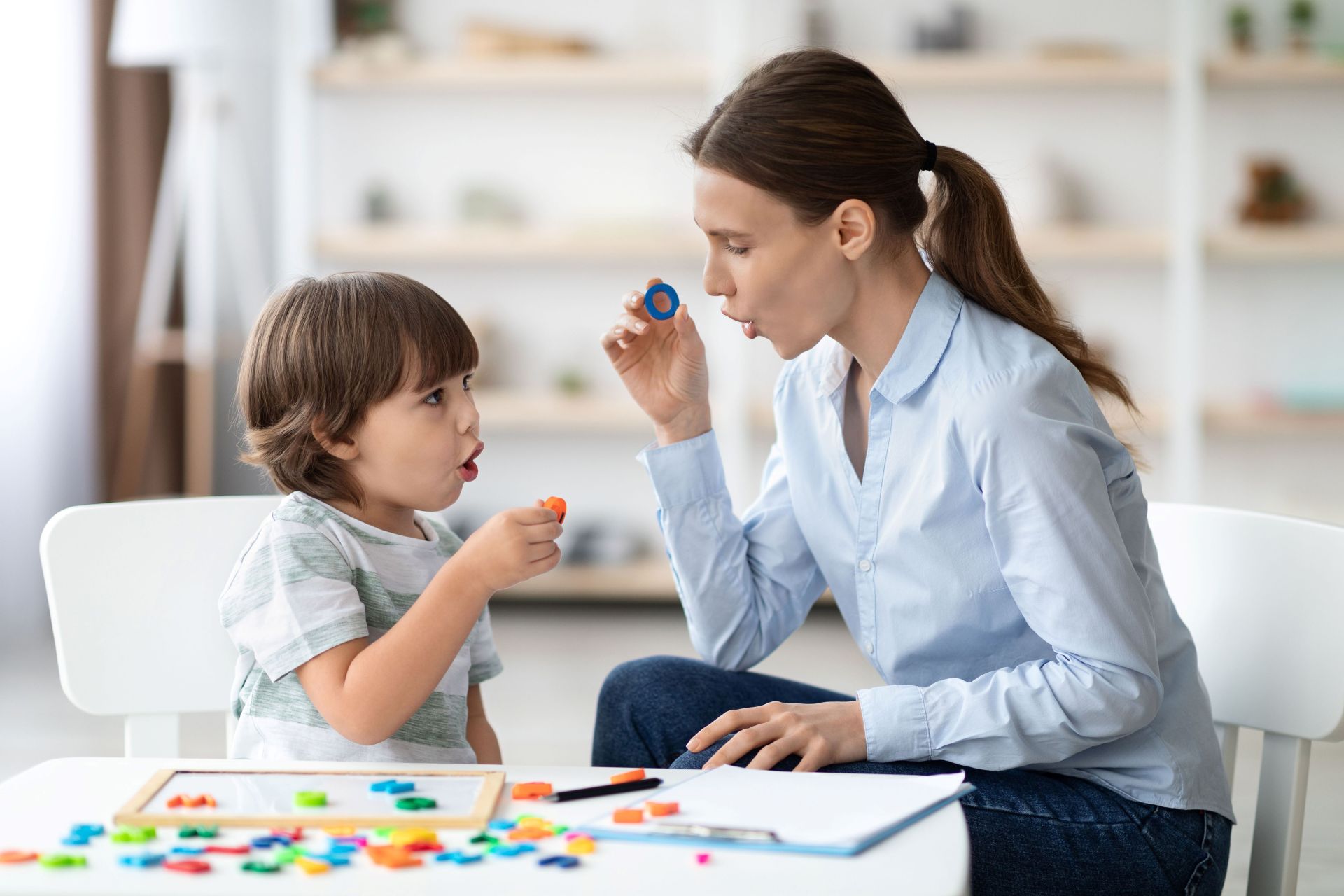Speech Therapy in the Early Learning Classroom
May is National Speech-Language-Hearing Month, so we wanted to take the opportunity to recognize and celebrate speech-language pathologists and all they do to support young children. Speech therapy is a specialized field of health care that focuses on helping people of all ages communicate effectively and overcome speech and language challenges.

How Speech Therapy Can Help Young Children in Early Learning Settings
Speech therapy can help young children in early learning in many ways, such as:
- Improving their speech clarity and intelligibility, which can boost their confidence and self-esteem.
- Enhancing their language skills, such as vocabulary, grammar, comprehension, and expression, which can support their literacy and academic achievement.
- Developing their fluency and voice quality, which can also reduce stuttering.
- Building their social skills, such as turn-taking, eye contact, listening, and engaging in conversation, which can foster their relationships and emotional well-being.
Speech therapy can also help young children in early
learning who have specific conditions or disorders that affect their speech and
language, such as:
- Autism spectrum disorder (ASD), which can impair social communication and interaction.
- Attention-deficit/hyperactivity disorder (ADHD), which can affect attention, impulsivity, and organization.
- Learning disabilities, such as dyslexia, dysgraphia, or dyscalculia, which can impact reading, writing, or math skills.
- Hearing loss, which can delay speech and language development.
- Cleft lip and palate, which can cause structural problems in the mouth and nose, which can impact speech development.
- Apraxia of speech, which is a motor speech disorder that affects the coordination of mouth movements.
- Phonological disorders, which are difficulties in saying speech sounds.
- Language disorders, which are difficulties in understanding or using language.
What to Expect from Speech Therapy
A speech-language pathologist, or speech therapist is a
trained professional who can assess, diagnose, and treat speech and language
difficulties in young children. A speech therapist can work with young children
in various settings, such as schools, clinics, hospitals, or home. A speech
therapist might provide:
- Screening and evaluation, which involves assessing the child's speech and language skills and identifying their strengths and areas for improvement.
- Individualized treatment plan, which outlines the goals, strategies, and activities for the child's speech and language therapy.
- Therapy sessions, which can be one-on-one or in a small group, depending on the child's needs and preferences. Therapy sessions can involve games, songs, stories, crafts, or other fun and engaging activities that target the child's speech and language goals.
- Progress monitoring, which involves measuring the child's improvement and adjusting the treatment plan as needed.
- Collaboration and consultation, which involves working with the child's parents, teachers, and other professionals to coordinate the child's care and support.
- Education and training, which involves providing the child's parents, teachers, and other professionals with information and resources on speech and language development and disorders.
How to Support Speech and Language Development in the Classroom
- Read to children and ask them questions about the story, characters, or pictures.
- Listen to the child attentively and respond to their comments, questions, or stories.
- Model speech and language and praise the child for their efforts and achievements.
- Expand the child's vocabulary and grammar by introducing new words and sentences and explaining their meanings and usage.
- Encourage the child to express their thoughts, feelings, and opinions and respect their views and preferences.
- Provide the child with opportunities to interact with other children and adults and teach and model social skills.
- Use a developmental screener and partner with the family if you have concerns about a child’s speech and language development.
- Collaborate with the child's speech therapist if they have one and use their recommendations and activities in the classroom.
Speech therapy can benefit young children in early learning by improving their speech and language skills, which can enhance their confidence, learning, and socialization. A speech therapist can support young children with speech and language difficulties and work with their family, teachers, and other professionals to support their development. As an early childhood educator, you can also support speech and language development in the classroom.

- The IMPACT Team
If you're interested in supporting language development, check out these courses:
All content, including the presentation thereof on this web site, is the property of Northwest Center IMPACT™, and protected by U.S. and international copyright laws. You may not copy, reproduce, distribute, transmit, modify, create derivative works, or in any other way exploit any part of copyrighted material without the prior written permission from Northwest Center.
Connect
-
Seattle, WA
-
impact@nwcenter.org
-
NWC Home
Policy pages
Subscribe & stay up to date
Copyright © 2025
